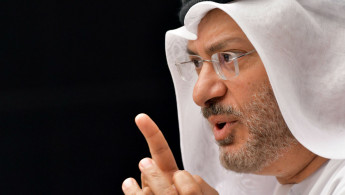UAE uses World Cup as a political football in new Qatar threats
Another attack has been launched on Qatar's hosting of the 2022 World Cup, with UAE Foreign Minister Anwar Gargash saying 'Doha should review its record'.
2 min read
Gargash warned Qatar on Twitter over its hosting of the 2022 World Cup [Getty]
UAE's foreign minister attacked the upcoming Qatar 2022 World Cup on Tuesday, saying that the country must "reject extremism and terrorism" to host the games, accusations that several Gulf states have levelled against Doha.
Minister of State for Foreign Affairs Anwar Gargash said on Twitter Qatar should only be allowed to go ahead with the World Cup if it "reviews its record" for allegedly supporting extremist groups.
"Qatar's hosting of World Cup 2022 should include a repudiation of policies supporting extremism & terrorism. Doha should review its record," Gargash wrote on Twitter, according to Reuters.
"Hosting World Cup 2022 should not be tainted by support of extremist individuals & (organisations)/ terrorist figures, review of Qatar's policies a must."
The call related to a diplomatic crisis in the Gulf pitting Qatar against regional rivals Saudi Arabia, UAE, Egypt and Bahrain over accusations Doha backs "extremist groups" likely due to its support for the Muslim Brotherhood.
The boycotting nations launched a blockade on Qatar in June forcing the Gulf state to find alternative trading partners.
The World Cup has been a target for the blockading countries, with Saudi Arabia and the UAE allegedly pressuring FIFA on the issue.
On Monday, influential Dubai intelligence chief Dhahi Khalfan also issued a threat to Qatar over the World Cup.
"If Qatar no longer hosts 2020 [World Cup], the crisis will go from Qatar because the crisis was
created to end it," he wrote on Twitter.
This weekend saw the release of a report by Cornerstone Global that alleged Qatar might give up hosting the World Cup due to the blockade.
Doha dismissed the report as being compiled by a group with an open "affiliation to the countries blockading Qatar" and said that companies constructing the eight stadiums for the games had found alternative suppliers.
Saudi Arabia, the UAE, Bahrain and Egypt began a blockade on Qatar in June, accusing it of supporting "extremism" and being too close to Iran.





 Follow the Middle East's top stories in English at The New Arab on Google News
Follow the Middle East's top stories in English at The New Arab on Google News
![The UAE is widely suspected of arming the RSF militia [Getty]](/sites/default/files/styles/image_330x185/public/2024-11/GettyImages-472529908.jpg?h=69f2b9d0&itok=Yauw3YTG)
![Netanyahu furiously denounced the ICC [Getty]](/sites/default/files/styles/image_330x185/public/2024-11/GettyImages-2169352575.jpg?h=199d8c1f&itok=-vRiruf5)
![Both Hamas and the Palestinian Authority welcomed the ICC arrest warrants [Getty]](/sites/default/files/styles/image_330x185/public/2024-11/GettyImages-2178351173.jpg?h=199d8c1f&itok=TV858iVg)